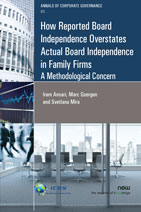How Reported Board Independence Overstates Actual Board Independence in Family Firms: A Methodological Concern
Iram Fatima Ansari, Sultan Qaboos University, Oman, iram@squ.edu.om , Marc Goergen, Cardiff University, UK and European Corporate Governance Institute (ECGI), Belgium, GoergenM@cardiff.ac.uk , Svetlana Mira, Cardiff University, UK, MiraS@cardiff.ac.ukAbstract
Despite successive codes of best practice of France, Germany and the UK highlighting the importance of the independence of non-executive directors, the codes tend to ignore the links that directors of family firms might have with the controlling shareholders. This is of particular concern for firms with concentrated family control as the risk of minority shareholder expropriation is greater for such firms. This paper proposes a new measure of board independence for family firms. Using a sample of listed French, German and UK family firms with an incumbent family CEO due for re-appointment or replacement over 2001-2010, we show that our measure of board independence is significantly lower than reported board independence. In contrast to reported board independence, our measure is a good predictor of the type of new CEO succeeding the incumbent CEO. Our results suggest that conventionally defined, or reported, board independence is biased and fails to provide investors, including minority shareholders, with an accurate measure of board independence. This conclusion has important policy implications for regulators and best practice in corporate governance.
How Reported Board Independence Overstates Actual Board Independence in Family Firms: A Methodological Concern
How Reported Board Independence Overstates Actual Board Independence in Family Firms: A Methodological Concern studies board independence in French, German, and UK listed family firms. It focuses on these countries because of their distinct legal and corporate governance systems. While investor protection is strong under UK common law, it is much weaker under French and German civil law. Ownership and control are much more concentrated in France and Germany compared to the UK and the three countries also differ in terms of their board structures. This monograph contributes to the literature both methodologically and empirically. After a short introduction, Section 2 reviews the literature on the influence of ownership and control of families in their firms, with particular focus on the CEO succession decision. The authors suggest that the choice of the CEO successor in family firms is determined by important corporate governance characteristics of these firms, the key determinant being correctly measured board independence. The discussion in this section is critical to support and develop the proposed measure of board independence in family controlled firms. Section 3 focuses on directors’ independence. This section begins with a discussion of the recommendations regarding board independence in the codes of best practice of France, Germany, and the UK. This is followed by a review of the literature and the motivation for adjusting directors’ independence. The authors present their methodology for the adjusted measure in Section 4, followed by a discussion of the observed differences between conventional and adjusted board independence in Section 5. Finally, Section 6 concludes.
